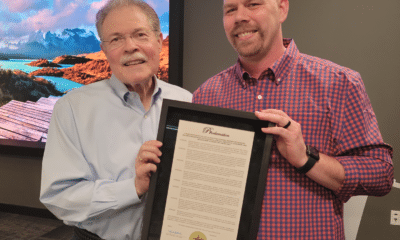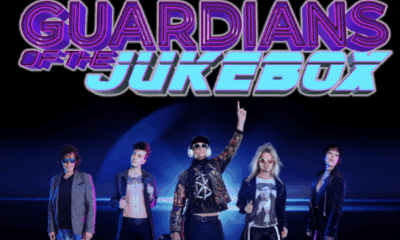City Government
Technology & Partnerships May Help Deter Crime in Peachtree Corners
Published
3 years agoon
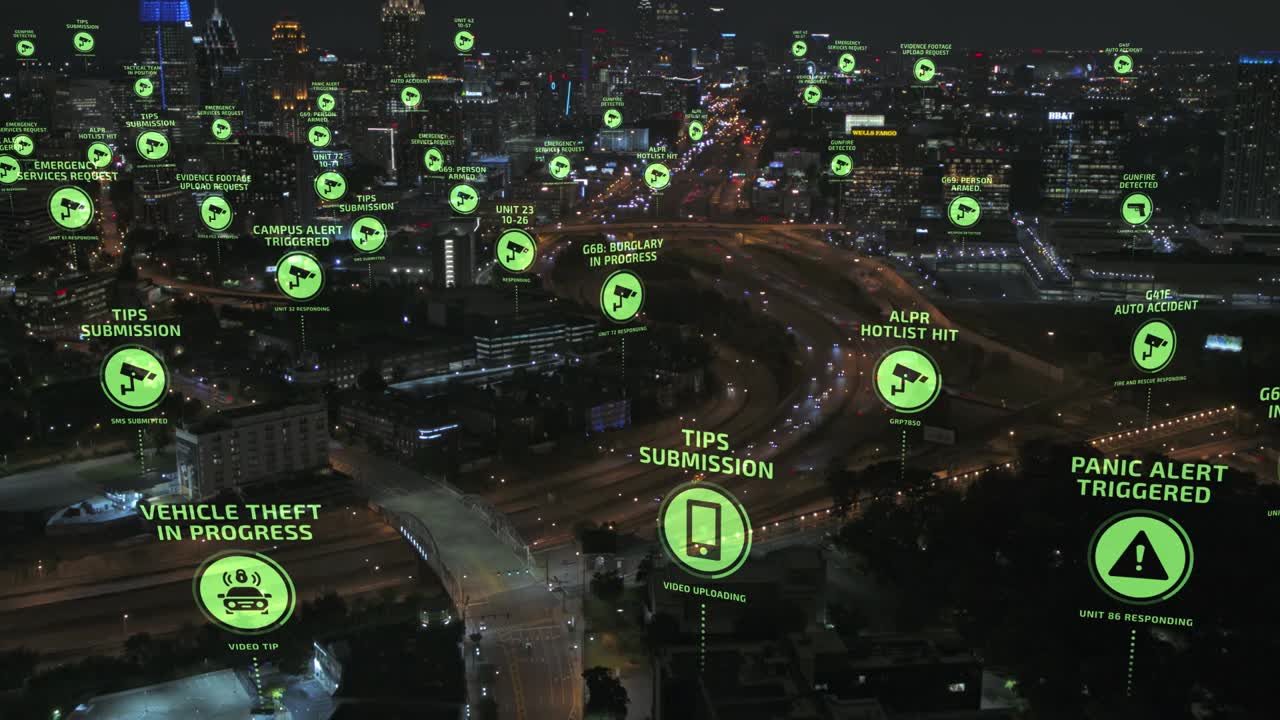
Meeting among local government, law enforcement, business interests and residents showcased how enhanced safety systems work.
With a perception that crimes such as car break-ins, burglary, and street takeovers are on the rise in the area, residents of Peachtree Corners met with local law enforcement agencies for a periodic overview of what’s being done to combat crime. Hosted by the United Peachtree Corners Civic Association, homeowners, business owners, government officials and interested parties met at Christ the King Lutheran Church for the update.
Perhaps the most impactful weapon against crime, besides the officers themselves, is technology.
“One of our responsibilities with the resources that we have is to do what we can to support Gwinnett County police as they fulfill that obligation for providing a safe community. And one of the ways that we’ve found we can do it is using technology as a force multiplier,” said Peachtree Corners City Manager Brian Johnson. “You’ve heard us talk in the past about using cameras to help the police department with the ability to collect data or use it to investigate or prosecute crime.”
The use of high-end technology began with license plate reader cameras that are in certain intersections of the city, he said. Currently, there are 50 that take a snapshot of license plates coming through those intersections.
“They have been used on a number of occasions to solve crimes and apprehend a number of people that have committed crimes here,” said Johnson.
He pointed out that the creation of the Town Center and the increased activity there is going to attract problems.
“You get knuckleheads who like to destroy property or get into altercations with people and so we are also … installing 68 video cameras at the Town Center,” Johnson said.
Those video cameras are for use by Gwinnett County for surveillance to ensure it remains a safe environment. Just having the cameras there won’t do much good without the technology to assist law enforcement in identifying threats.
RTC3 integrates systems for better public safety
Johnson explained that many businesses have their own video security systems and would be overjoyed to link them up with the local police. “We happen to be privileged and lucky to have a company here that actually has solved the way to do that,” said Johnson. “We have a corporate tenant of the city, a company called Fusus that is very much in keeping with the technology.”
Fusus is known in law enforcement and public safety circles for its leading-edge RealTime Crime Center In The Cloud (RTC3) platform. A 2020 member of Atlanta Inno’s “50 on Fire,” Fusus has been recognized as among the hottest new companies in the Atlanta area.
The company moved its headquarters to a larger office space in Peachtree Corners in 2020 due to rapidly increasing demand for its platform. The Fusus RTC3 platform’s video intelligence and map-based awareness interface serves as the central integration point for law enforcement agencies’ surveillance, security and life safety technology.
Fusus brings all personnel and emergency operations centers under a unified umbrella that aggregates video and data, and directly integrates with 911 Computer Aided Dispatch (CAD) systems, enabling agencies to geolocate officers and units in the field via the native fususOPS app, track calls for service and better coordinate their resources.
“I am a proud resident of Peachtree Corners and I intend to be for many more years,” said Chris Lindenau, CEO of Fusus. “One of the things I love about the city is that we are pulling a lot of innovation to it from around the Atlanta metropolitan area. And for those of us in the technology sector, this has always a been challenge.”
A graduate of Georgia Institute of Technology, Lindenau resisted the pull of San Francisco and Silicon Valley to stay right here and be a part of “Silicon Orchard.” He started Fusus in June 2019.
“The reason we started this company is that we saw a real gap in law enforcement and the ability to pull in disparate technology sets to make use of what was there,” said Lindenau. “We all understand camera technology. We understand radios, right? Law enforcement uses radios. We understand that they have vehicles, and they need to know where their officers are at any given time in those vehicles. We understand that they have 911 dispatch systems.” He explained that the challenge in law enforcement is putting all those different systems together.
Business community and police collaborate more easily
Fusus found success in April 2020 by testing the system in Minneapolis. The real-world need was stepped up a month later with the death of George Floyd at the hands of police.
“So the concept of just putting more law enforcement in the field was no longer viable,” said Lindenau. “We were born out of necessity to address an underlying issue that we knew was not just unique to Minneapolis, and that was that law enforcement needed new, novel ways to collaborate with the community. They could not go it alone. They needed their business community stakeholders to contribute back to that understanding of what was going on in the city.”
The intent of the program is to allow Gwinnett County Police to work more closely with the business community in sharing, among other things, video data. The collaboration will improve real-time response and enable law enforcement to have a clearer, quicker operational understanding of what’s going on in and around an issue. It will allow for things like graffiti on the bridge to not just be something that police respond to after the fact but perhaps deal with as it occurs. The program has already caught street racers in the midst of a “takeover” that resulted in multiple arrests.
The technology could also be a help in everyday issues like traffic jams. It doesn’t have to work only for situations under duress, said Lindenau.
“But ultimately, the goal is to allow the business community to get back into work in concert with their partners and law enforcement. One thing I want to emphasize is that this is a completely voluntary program, and the owners of these video sources have full control over the circumstances in which they’re shared. They can, through the flow switch, opt out of the program anytime,” Lindenau added.
“It’s very important to emphasize that we want to make sure that privacy is the bedrock foundation of everything we do, because I, as a fellow resident, don’t want to concede my privacy rights for public safety and security here in Peachtree Corners. That’s something I think we all share.”
The video streaming is set to begin in non-residential areas. Unlike video that’s shared on social media platforms like NextDoor, Facebook and Twitter, sharing with police is private. It won’t live forever on the internet. And its sole purpose is to resolve investigations more quickly.
The technology is active in about 110 cities across the country. Now, the city where it was developed will be part of that number.
Video below from the C.O.P.S. meeting and a video from FUSUS
Related
Arlinda Smith Broady is part of the Boomerang Generation of Blacks that moved back to the South after their ancestors moved North. With approximately three decades of journalism experience (she doesn't look it), she's worked in tiny, minority-based newsrooms to major metropolitans. At every endeavor she brings professionalism, passion, pluck, and the desire to spread the news to the people.

City Government
Brandon Branham Honored for Transformative Leadership in Peachtree Corners
Published
4 days agoon
May 20, 2025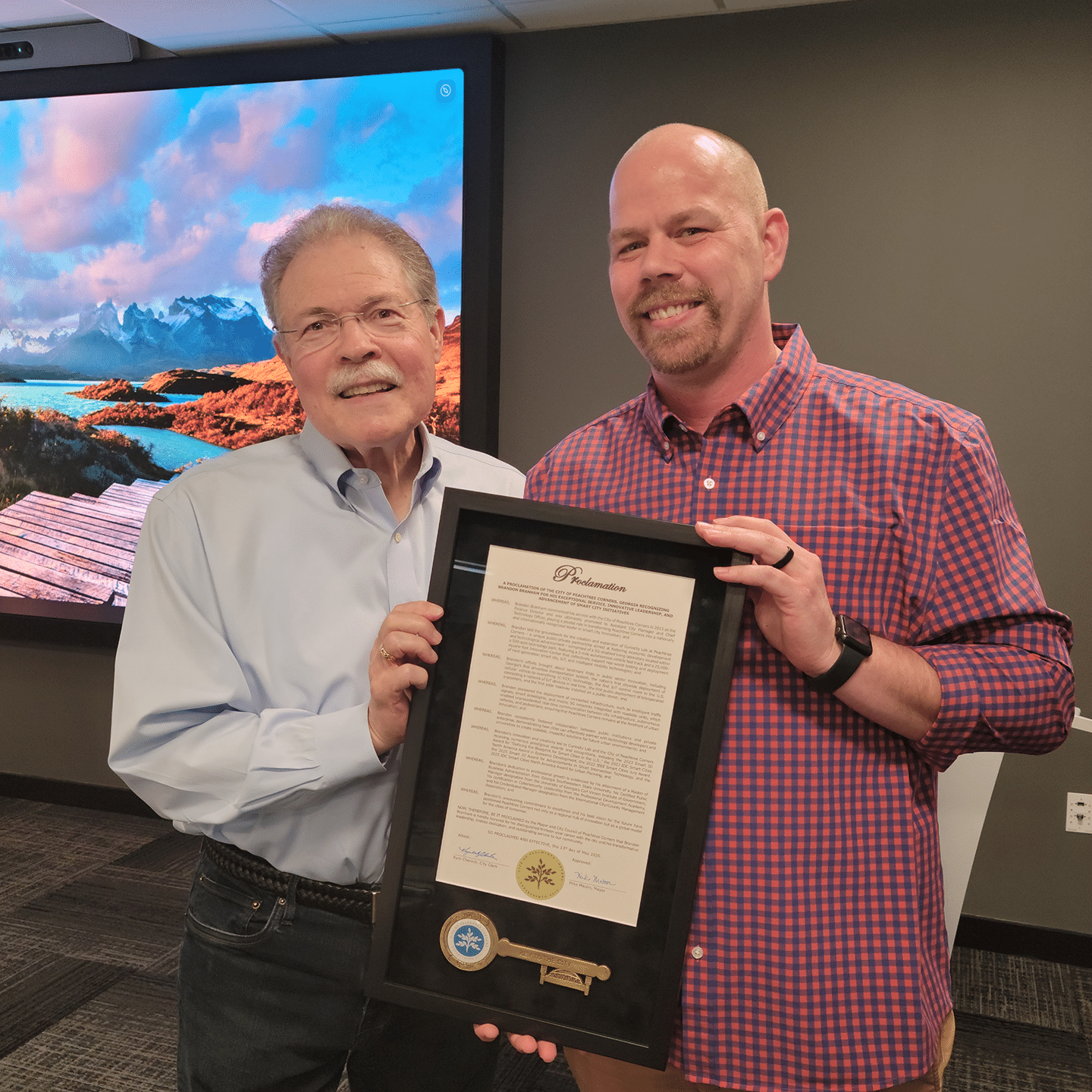
The City of Peachtree Corners recently honored Assistant City Manager Brandon Branham with an official proclamation for his years of leadership and service to the city.
Branham began his tenure in 2013 as finance director and was later promoted to assistant city manager and chief technology officer. In each of those roles, he’s played an instrumental part in guiding Peachtree Corners’ transformation from a suburban community into an internationally recognized hub of technology and innovation.
A decade of accomplishments
Among his many accomplishments, Branham spearheaded the development of the Curiosity Lab at Peachtree Corners, a 5G-enabled living laboratory and innovation center located within a 500-acre technology park.
Under his leadership, the city also achieved numerous national firsts in public sector technology, including the launch of Georgia’s first driverless shuttle system, the country’s first citywide C-V2X (cellular vehicle-to-everything) deployment and the first solar roadway installed on a public street.
“Brandon’s vision and commitment to innovation have positioned Peachtree Corners at the forefront of smart city development not just in Georgia, but across the nation,” said City Manager Brian Johnson. “His leadership has shaped the future of our city, and we are deeply grateful for his service.”
Partnerships and collaborations
Throughout his twelve-year career with the city, Branham emphasized collaboration between the public and private sectors, creating partnerships with tech companies and academic institutions to pilot scalable, real-world solutions.
His efforts have garnered numerous accolades for Peachtree Corners, including multiple Smart Cities awards and recognition for urban planning and intelligent mobility technologies.
New opportunities
Now, as Branham prepares to leave his role and move on to new opportunities, the City of Peachtree Corners “extends its heartfelt appreciation and best wishes for his continued success.”
“Brandon has left a lasting legacy,” Johnson said. “We look forward to seeing the impact he’ll continue to make in the smart city space and beyond.”
Related
City Government
Peachtree Corners Hosts Discussion About the Future of Local Policing
Published
2 weeks agoon
May 12, 2025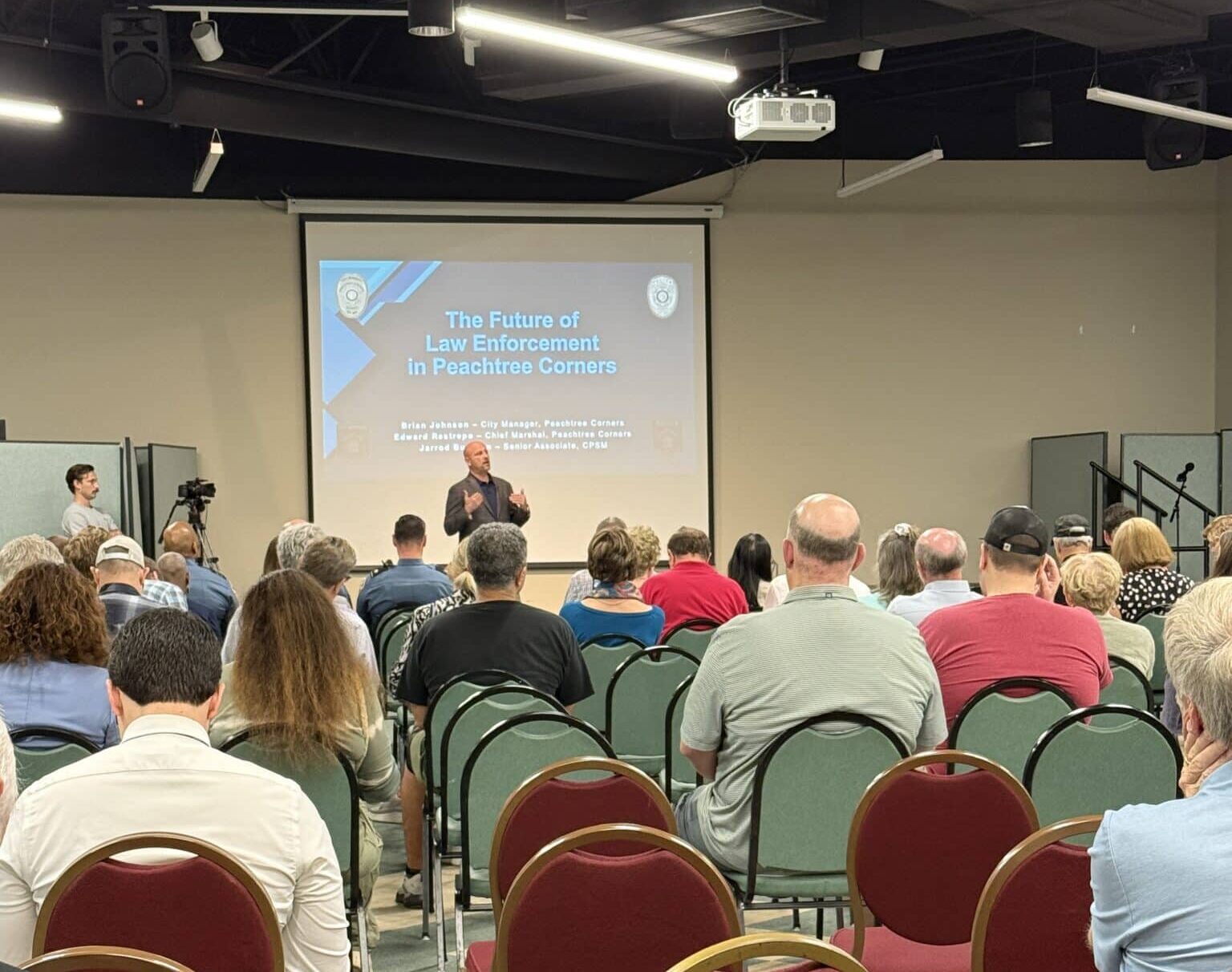
Although crime isn’t on the rise, and the Gwinnett County Police Department (GCPD) is fulfilling its role in fighting crime, the City of Peachtree Corners is asking residents, business owners and city stakeholders if they believe the city should form its own police department.
With over 100 people in attendance, City Manager Brian Johnson led the discussion about the future of policing in Peachtree Corners. He presented the findings from a survey conducted by the Center for Public Safety Management (CPSM), a nationally-recognized law enforcement consulting and training firm, as well as information about patrol officer staffing, response times, costs to tax payers and a potential timeline.
Ensuring public safety
Johnson kicked off his presentation by explaining that it is the duty of the mayor and city council to ensure public safety, including reviewing law enforcement.
“Maybe it needs to grow, maybe it needs to change its focus. But city council is the one that has the decision-making responsibility,” he said.
He was also adamant that this isn’t a done deal.

“I hit this point already, but I want to hit it again. This is the start of a conversation, a community conversation and feedback to council. There hasn’t been a decision,” he said. “Council has not received this presentation from me. They’re here to watch and learn from your feedback of this.”
Mayor Mike Mason was present at the meeting, along with all of the city council members except Eric Christ who was out of town and watching remotely.
Issues and obstacles
Johnson explained that the grounds for the inquiry were based on issues about communication, access to information and enforcement of city-specific ordinances. He cited an example where a city rule that private residences can’t be rented on a short-term basis like Vrbo or Airbnb wasn’t enforced by GCPD. An owner tried to circumvent the ordinance by only renting the outside of the house. A loud pool party ensued, and frustrated neighbors dialed 911.
“Officers showed up and they said, ‘We can’t enforce the city’s noise ordinance,’” Johnson said.
The first stage to fix this problem was creating the marshal program to bridge the gap between code enforcement and GCPD.
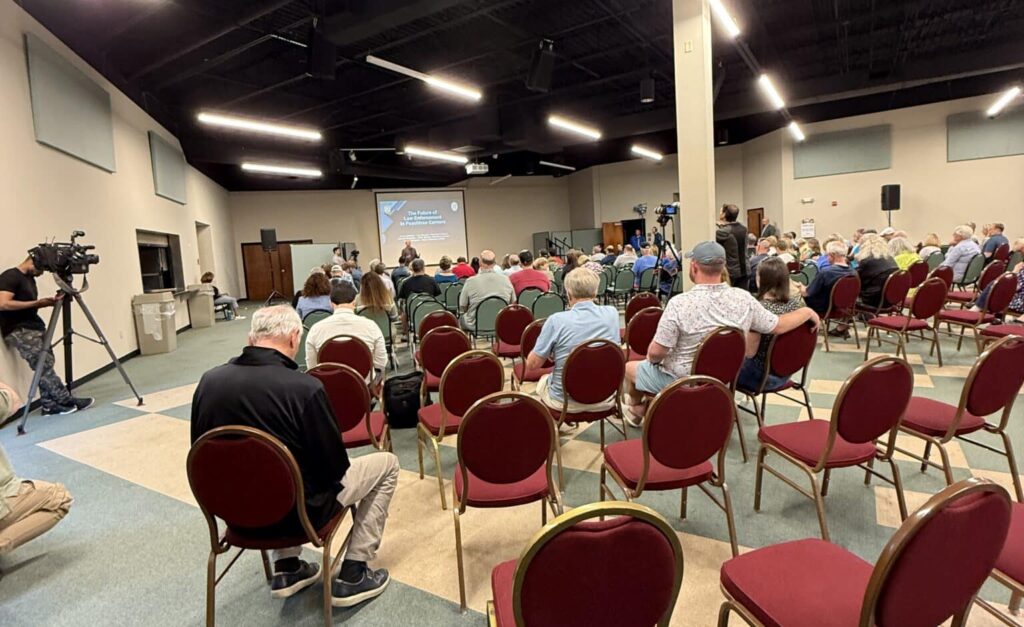
“[We thought] they would be able to enforce both local ordinance and state law, since they are a function of the city, and they could maybe be a force multiplier for Gwinnett since [marshals] don’t have to respond to 911 calls,” said Johnson.
But other issues arose shortly after the department was formed.
“We were still working towards getting that good balance, but we have been faced recently with a couple of things that make it harder for us,” said Johnson.
Seeking shared access
Instead of GCPD giving PTC marshals read-only, quick access to incident reports, dispatch calls and other information, the marshals department was required to file open records requests through the same process as any civilian.
“They were denied, as well as the city of Sugar Hill, [when] asked for the ability to see, not change, but see the computer-aided dispatch information, so that they would know where Gwinnett County police officers were; so that they could avoid stepping on their toes or maybe looking to support their efforts, and they haven’t been granted that,” said Johnson.
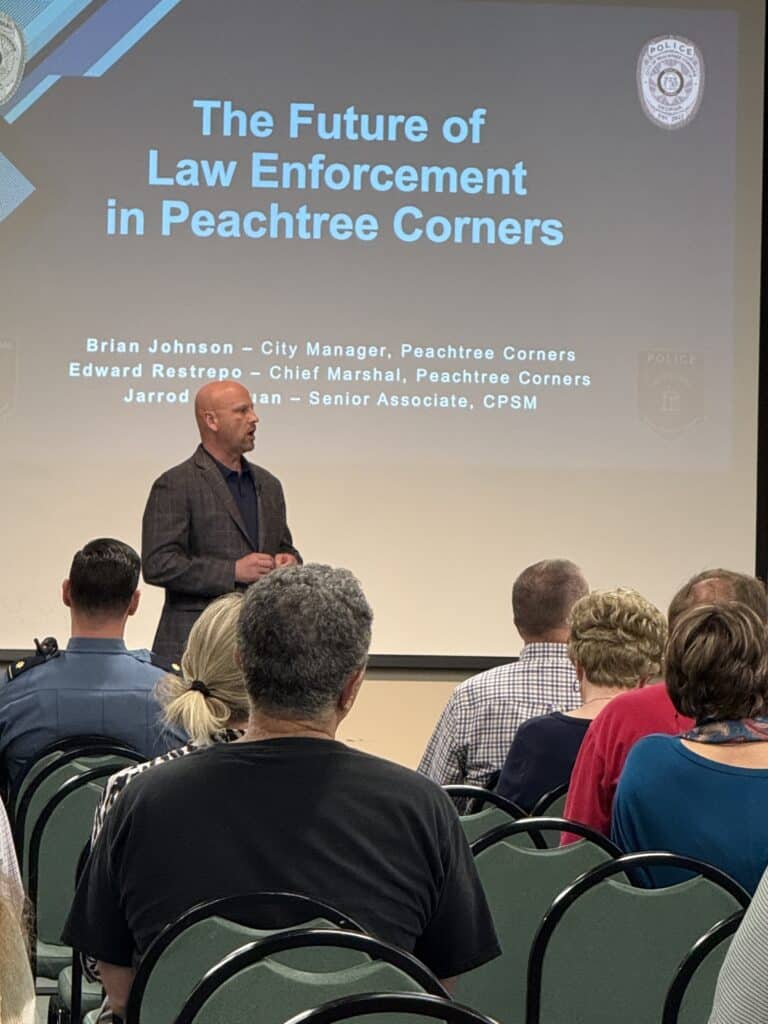
He added that the GCPD has video cameras on certain roadways that are used for various reasons, and law enforcement can use them when there’s crime in the area. Peachtree Corners marshals were denied access to those cameras.
“Conversely, we have a couple hundred cameras in the city, and we definitely want them to have access to them,” said Johnson. “So the frustration out of not being able to get that symbiosis between the marshals and police made us start thinking, all right, you know, is there another option?”
Community feedback
CPSM utilized data from GCPD to discern if Peachtree Corners could feasibly stand its own force. It also took into consideration crime trends, costs and many other factors. It recommended a 55-officer department, costing $12.1 million annually, with a $2.2 million upfront cost.
Comparing the two options to “renting vs. owning” the primary law enforcement agency in the city, Johnson presented pros and cons for each. Once the question-and-answer portion began, there was no obvious choice. Men and women, young and more advanced in age, had both similar and differing opinions.
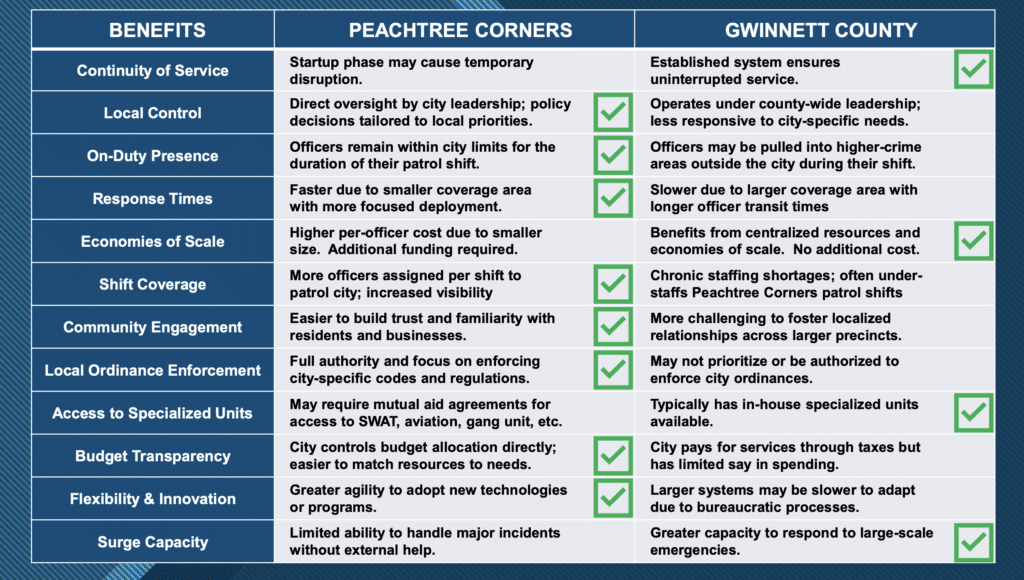
One young man, who identified himself as a local small business owner named Alexander, argued that with artificial intelligence increasing the efficiency of administrative tasks, perhaps the city wouldn’t need a full 68-man department of civilians and sworn officers.
Some accused the city of devising a solution in need of a problem. Others were concerned that paying approximately $100,00 for a study was throwing good money after bad.
But at the end of it all, the city is continuing to seek feedback and is encouraging everyone to make informed decisions. The meeting was taped and is available on the city website along with Johnson’s PowerPoint presentation, a copy of the study done by CPSM and a survey.
As far as a timeline goes, city officials would like folks to take the summer to mull it over and come back in the fall to take another look at the proposal.
Related
City Government
City of Peachtree Corners Awarded Certificate of Achievement From GFOA for Seventh Straight Year
Published
2 weeks agoon
May 9, 2025
The City of Peachtree Corners’ finance department has been awarded a Certificate of Achievement for Excellence in Financial Reporting from the Government Finance Officers Association of the United States and Canada (GFOA) for its 2024 financial year-end comprehensive annual financial report (CAFR).
The GFOA’s Certificate of Achievement is the highest form of recognition in governmental accounting and financial reporting, and its attainment represents a significant accomplishment by a government and its management.
It is the city’s seventh year of receiving the award and represents a significant accomplishment by the city’s finance department and its leadership.
According to a GFOA release, “The report has been judged by an impartial panel to meet the high standards of the program, which includes demonstrating a constructive ‘spirit of full disclosure’ to clearly communicate its financial story and motivate potential users and user groups to read the report.”
“We are pleased to again receive this honor,” said City Manager Brian Johnson. “Our finance department, and Finance Director Cory Salley, are to be commended for this achievement, as it is the highest form of recognition GOFA presents.”
A comprehensive annual report
The city’s finance department produces the CAFR each year and works with independent auditors to verify the city’s financial situation and standing.
“This prestigious award affirms Peachtree Corners’ dedication to exceeding basic requirements by producing comprehensive annual financial reports that reflect a strong commitment to transparency and full disclosure,” said Assistant City Manager Brandon Branham.
About the GFOA
The Government Finance Officers Association (GFOA), founded in 1906, represents public finance officials throughout the United States and Canada.
The association’s more than 20,000 members are federal, state/provincial and local finance officials deeply involved in planning, financing and implementing thousands of governmental operations in each of their jurisdictions. GFOA’s mission is to advance excellence in public finance.
To learn more about the GFOA, visit gfoa.org.
For more about the City of Peachtree Corners, visit peachtreecornersga.gov.
Related
Read the Digital Edition
Subscribe
Keep Up With Peachtree Corners News
Join our mailing list to receive the latest news and updates from our team.
You have Successfully Subscribed!

Peachtree Corners Hosts Discussion About the Future of Local Policing

MomoCon 2025 to bring 60,000 Fans to Atlanta for a Weekend of Cosplay, Animation, Gaming and Music

D1 Training Brings New Fitness Concept to Peachtree Corners

Atlanta’s Dog Howl-O-Ween Festival Moving to Peachtree Corners for 2025

From Boardrooms to the Himalayas: Vandana’s Journey to Purpose and Growing with Intention [Podcast]

Local Special Olympics Pickleball Team Honored with State House Resolution

Brandon Branham Honored for Transformative Leadership in Peachtree Corners

Music Matters Productions Expands Peachtree Corners Headquarters

Celebration and Community: ICAGeorgia Wraps Up School Year with Two Festive Events

Guardians of the Jukebox to Play the VoxStage on May 31

Music Matters Productions Expands Peachtree Corners Headquarters

Brandon Branham Honored for Transformative Leadership in Peachtree Corners

From Boardrooms to the Himalayas: Vandana’s Journey to Purpose and Growing with Intention [Podcast]

MomoCon 2025 to bring 60,000 Fans to Atlanta for a Weekend of Cosplay, Animation, Gaming and Music

Local Special Olympics Pickleball Team Honored with State House Resolution

Atlanta’s Dog Howl-O-Ween Festival Moving to Peachtree Corners for 2025

Light up the Corners [Video]

Capitalist Sage: Business Leadership in Your Community [Podcast]

Cliff Bramble: A Culinary Adventure through Italy

Top 10 Brunch Places in Gwinnett County

A Hunger for Hospitality

THE CORNERS EPISODE 3 – BLAXICAN PART 1

Top 10 Indoor Things To Do This Winter

The ED Hour: What it takes to Remove Barriers from Education

Peachtree Corners Life
Topics and Categories
Trending
-
Business5 days ago
From Boardrooms to the Himalayas: Vandana’s Journey to Purpose and Growing with Intention [Podcast]
-
City Government4 days ago
Brandon Branham Honored for Transformative Leadership in Peachtree Corners
-
Business3 days ago
Music Matters Productions Expands Peachtree Corners Headquarters
-
Entertainment2 days ago
Guardians of the Jukebox to Play the VoxStage on May 31






